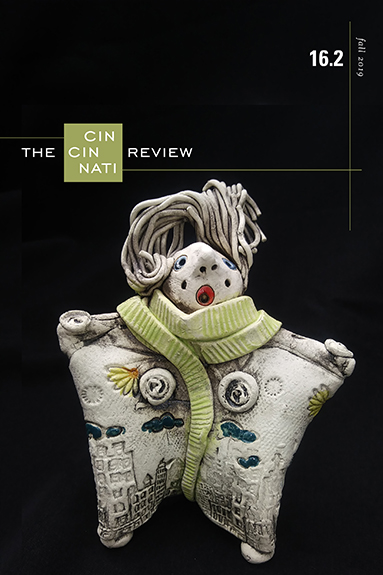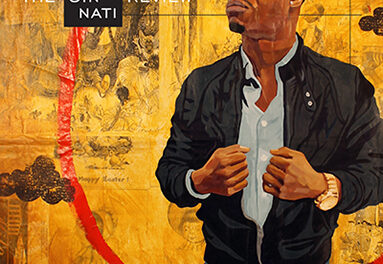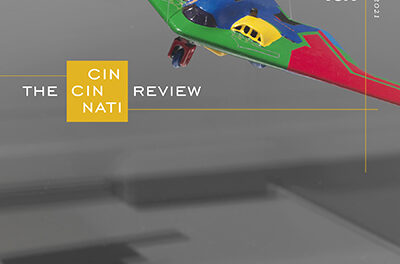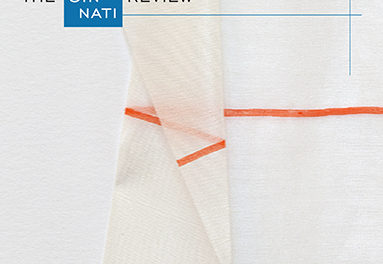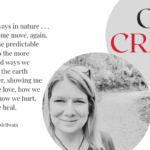Tonight we the living gather to meditate on death—while eating hamburger sliders, in fact, and pumpernickel crackers spread with pâté, plus celery and carrots and various berries and wine that comes in a box but is not that tacky college kind. The spread is part of the funeral home’s Life Well Lived package, which also includes the hearse parked out back, the white lilies on every available flat surface, and the rosewood coffin where Papa now lies, prim and gauzy and altogether unlike he ever was in life.
Two of our siblings, estranged now for years, lock eyes over the coffin and try tight-lipped smiles.
“Did you ever see him in this suit?” Here is our sister, the youngest one, tense and poised.
Our brother shakes his head. “He must have been saving it for the occasion.”
Her mouth loosens, and she begins to resemble that brother, who is about to say something else. But just then, someone from the old days sidles up, slider in hand, and says: “Isn’t it strange how life goes on?”
As our children check their phones in the mahogany chairs by the door and the funeral director says the time we’ve bought with our father’s body is almost up, we the living are forced to reflect that it is indeed strange how life goes on. For instance: After we’ve consumed all the finger food and wine and packed our children into the rental cars, some of us have to stop for gas on the way to dinner, and we have an actual debate in the car about whether to go to Shell or Mobil. One of us remarks on how cheap gas is around here, and we launch into a discussion about the long-term environmental effects of shale-gas fracking, which continues until we remember that we’re gathered here to meditate on our father’s life and death, at which point we fall into a chastened silence that lasts for several minutes, until one of us puts on, of all things, a Bob Marley mix CD his buddy Todd made him. “Is This Love” plays until we reach the restaurant, an Italian American casual-dining chain restaurant that exists nearly everywhere and therefore feels like nowhere at all. Olive Garden was Papa’s favorite, even though we all avoid the place in our everyday lives, which are continuing on as the restaurant’s signature garlic breadsticks arrive, robed in napkins and drenched in what we all hope is olive oil.
Tonight we gather, gobbling breadstick after breadstick, to meditate on the death of a man some of us struggled to love—a man who believed primarily in the supremacy of American Motor Vehicles and in the birth, death, and resurrection of Our Lord Jesus Christ; a man who thought his neighbors were sacrificing goats because they sometimes played electronic music after 10:00 p.m.; a man who put us on a plane and brought us here (first to the United States, when we were children, and later to this particular Olive Garden in Flagstaff, Arizona). We raise our glasses to the man who made us change our names from Luisa to Louise, Patricio to Patrick, Rosa to Rosie, Marcial to Marshall, María to Mary, José to Joseph, because he’d lost his faith in Argentina (where Juan Perón was president and the communists were winning) and placed it instead in America—in the capital-A America of mown lawns and proper motor vehicles and suburban sprawl, the America of Eisenhower, the America of Senator Joseph McCarthy and lax gun laws, the sepia-toned America that America Herself would frame and put on Her mantelpiece in old age and infirmity if She were a living breathing woman instead of a collectively imagined union of semiautonomous states held together by a legacy of slavery and aggressive foreign intervention, the extraction and sale of fossil fuels, a large and mounting foreign deficit, the underpaid or unpaid labor of the world’s largest incarcerated population, and the underpaid or unpaid labor of Chinese, Thai, Indian, Ethiopian, Vietnamese, Cambodian, Indonesian, Ecuadorian, Bolivian, Bangladeshi, Mexican, and, yes, even sometimes Argentinean men and women; a union held together, also, by something called the Financial Services Industry, by televised sports, casual-dining chain restaurants, and a staggeringly seductive dream of plurality and prosperity that is still, unlike Papa, alive today.
Here’s the plan: we will watch the Arizona Cardinals game and avoid all topics of any conceivable emotional, social, or cultural consequence. Some of us live in regions and communities where football is an entrenched part of the social fabric; some of us don’t. Some of us believe in the birth, death, and resurrection of Our Lord Jesus Christ; some of us don’t. Four of us live near the coast, drink on the weekends, and talk about our privilege, while the eldest two siblings live in the middle of the country, attend antiabortion rallies on the weekends, and speak, from time to time, in tongues. Some among us may even think the others shouldn’t be getting an equal share of Papa’s money, for reasons that include (but are not limited to) godlessness. So we will watch the Cardinals and eat our breadsticks.
. . .

